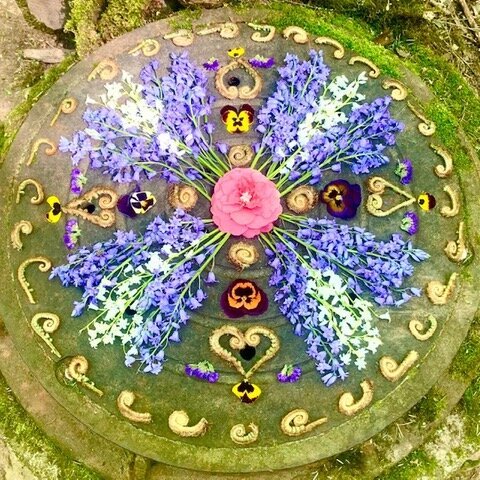Hod: Follow Through & Humble Dedication [Kabbalah Root Medicine Series]
We welcome Hod in the fifth week of our count of the Omer. Hod is the response to Netzach. They are a pair that cannot be disconnected from one another. Like two legs walking, Hod and Netzach require one another for stability and forward thrust. Netzach thrusts into life with enthusiasm and verve, but it cannot make its way without the follow through and balance of Hod.
Whereas Moses and Esther who occupy the place of Netzach and the archetype of prophecy, it is Aaron and Sarah in the place of Hod, for they demonstrate the “how-to” to implement the vision. Hod is all about the sacred technology, the modus operandi, the work on the ground.
In Hod we manifest through dedication and humility. Let me stress here: we don’t manifest through personal effort but through connecting with our joy in serving a larger purpose. Hod teaches us that if we are becoming exhausted or lack-lustre, it may be time to back off and realign with our natural joy and connection to our work. Like Aaron, who was humble and sought nothing but the greater peace, we, too, can re-align ourselves with a far greater energy than our own. We do this through simchah shel mitzvah, the joy of fulfilling God’s will, not our own efforts, but our whole-hearted dedication.
SUGGESTED PRACTICES:
Be on the lookout for people who are in need, who ask for your energy in whatever form. Humbly ask: “How can I help?”
This week, be especially mindful of giving thanks for the food you eat, the rest you take, and for those who grace your life.
Show up. Be available. Go places you might normally consider are not worth your while, for people with whom you might not associate. Once there, be forthcoming; do whatever is called for.
CONTEMPLATIVE TEXTS:
#1:
The Radziminer Rebbe said:
One who crosses the sea and survives a storm thanks God.
Why not thank God when there is not storm? One who survives an illness thanks God. Why not one who escapes illness altogether?
#2:
Thank You, My Fate
by Anna Swir
Great humility fills me,
Great purity fills me.
I make love with my dear
as if I made love dying
as if I made love praying
tears pour
over my arms and his arms.
I don’t know whether this is joy
or sadness, I don’t understand
what I feel, I’m crying,
I’m crying, it’s humility
as if I were dead,
gratitude. I thank you, my fate,
I’m unworthy, how beautiful
my life.
#3:
Upon Awakening
John O’Donohue
I arise today
In the name of Silence,
Womb of the Word,
In the name of Stillness,
Home of Belonging.
In the name of the Solitude of the Soul and the Earth
I arise today
Blessed by all things,
Wings of breath,
Delight of eyes,
Wonder of whisper,
Intimacy of touch,
Eternity of soul,
Urgency of thought
Miracle of health,
Embrace of God.
May I live this day
Compassionate of heart,
Clear of word,
Gracious in awareness,
Courageous in thought
Generous in love.
#3:
Humble Prayer
Rabbi Moshe HaKatan
When I walk through thy woods
May my right foot and my left foot be harmless to the little creatures
That move in the grasses, as it is said by the mouth of the prophet:
They shall not hurt or destroy on my holy mountain.
#4:
Heeding the Call/Dedication to the Torah
Rabbi Alexandri said:
Two donkey drivers who hated each other were once walking on a road when one of the donkeys collapsed under its burden. The other river saw this but continued on his way. But then he reflected: Doesn’t the Torah say: ‘If you see the donkey of one who hates you lying flat under its load and (your inclination is to) refrain from raising it, you must nevertheless raise it with him?’ (Exodus 23:5) So the man returned, lent a hand, and helped his enemy to rearrange the load. He began talking to his enemy: “Loosen it a bit here, pull a bit tighter here, unload it over there…” Before long, peace developed between the two of them, so that the driver of the unloaded donkey reflected, “I thought he hated me, but look how compassionate he was.” By and by, the two entered an inn, ate and drank together and became friends. What caused them to make peace? Dedication to the Torah, which tells us to heed the call.

